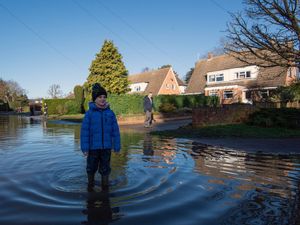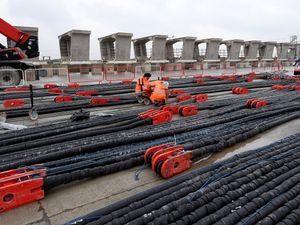UK flooding could increase by average 15-35% by 2080, study suggests
Parts of Scotland face a 34% increase in flooding in the next 50 years but in south east England there is just an 18% increase expected.

Flooding across the UK could increase by an average of 15-35% by the year 2080, a new study has suggested.
Researchers from the Water Resilient Cities project at Heriot-Watt University in Edinburgh looked at flooding activity deemed “one in two-year” and “one in 30-year” events for their projections.
This covers the likelihood of a flood event occurring – for example, a one in two-year return period run-off or flood event has a one in two chance of being equalled or exceeded in any given year.
Parts of Scotland face a 34% increase in flooding in the next 50 years, according to the study, but at the other end of the UK, in south-east England, there is just an 18% increase expected.

Dr Annie Visser-Quinn, a data scientist at Heriot-Watt, said: “We used multiple datasets and methods and compared the results, using the most up-to-date data available.
“The estimates paint a concerning picture for the future UK flood landscape, especially when combined with increasing urbanisation.
“Across the UK, we found that the magnitude of the one in two-year event could increase by 15-35%.
“The north and east of Scotland is facing a 34% increase in the magnitude of flood events, which is significant – the north of England and Wales are similarly high at 25-28%.
“London and the Midlands have the lowest percentage increase. The magnitude of their one in two-year events will increase by 18% – even a small increase can have a profound impact on urban areas.”
It comes as communities began to brace for Storm Christoph, with “significant” rainfall due across large swathes of the UK.
Major incidents had been declared in Greater Manchester and South Yorkshire amid amber and yellow weather warnings for the storm with snow also expected northern areas.
Last year’s Storm Dennis was considered a “one in 30-year” event, but the scientists are unable to say whether the incidence of this will increase in years to come.
Dr Visser-Quinn added: “We couldn’t get the different models to agree on those more unusual, extreme events, so there is still uncertainty there.
“However, we do think the bigger change will occur in the south and south-west of England.
“That’s concerning given these are the more extreme events.
“Robust modelling will help improve our flood preparedness, which is why this work is essential.
“New climate data coming out later this year should be investigated as quickly as possible to inform the UK’s flood protection policies.”





